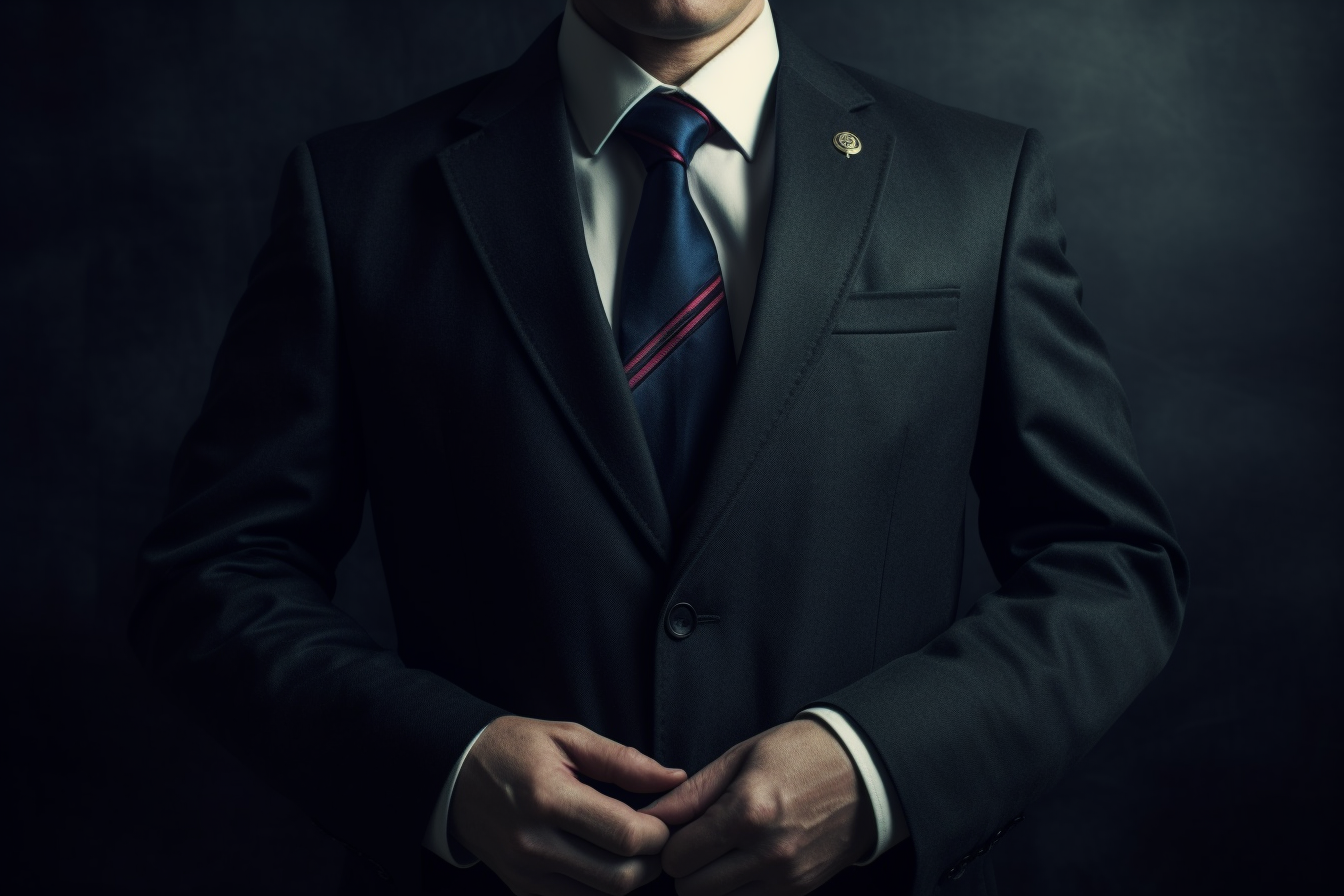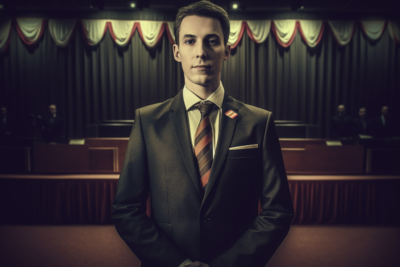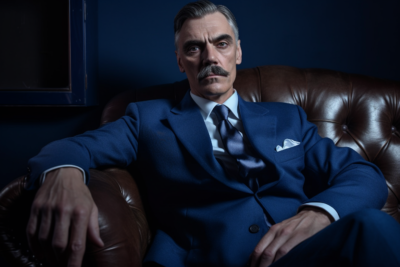Why Do Politicians Wear Suits?

Politicians wear suits to show their respect and professionalism. The suit is a classic look that has been around for centuries, and it symbolizes power, authority, trustworthiness, and gravitas. It also conveys the message that the politician takes his or her job seriously.
The traditional suit consists of trousers, a jacket, and a shirt with a collar – all made from matching fabric in one color. Politicians may opt for lighter shades such as navy blue or grey which are considered more formal than black but still convey seriousness and decorum. They often complete their look with accessories such as ties or pocket squares in complementary colors to add detail to their outfit without being too distracting.
What makes politicians’ outfits unique is the way they choose them – usually taking into account factors like current fashion trends, cultural norms, and appropriate occasions when deciding on what type of suit they should be wearing at any given time. For example, when attending an important event they may choose darker shades while at less formal events they might go for something brighter or bolder in order to stand out amongst other attendees. Politicians need to make sure that their clothing looks well-fitted so it does not draw attention away from their words but instead complements them in order to emphasize their ideas further; this means paying special attention to details like cufflinks or belt buckles which can help create an overall polished look.
In short, politicians wear suits because these garments allow them to express themselves through subtle yet effective sartorial choices while ensuring that people take notice of what they have said rather than how they looked saying it; after all, there are few items better suited (pun intended) for conveying seriousness without looking drab.
History Of Politicians Wearing Suits
Since the dawn of politics, politicians have donned suits as a sign of authority and respect. As far back as Ancient Rome, rulers sought to distinguish themselves from their subjects through dress. Julius Caesar himself is known for wearing elaborate garments fit for his station. Over time, different countries adopted similar styles of clothing to signify power and prestige in government officials.

During the Renaissance period, upper-class men began adopting more tailored looks with intricate embroidery and accessories that conveyed social status. This trend was quickly adopted by political figures who sought to stand out among their peers while displaying an air of affluence and sophistication. The use of a tailored suit has been commonplace ever since then – making it a key part of any politician’s wardrobe today.
The late twentieth century saw further developments in politicians’ fashion choices due to changing times and technological advancements such as television broadcasting which allowed for better visibility on the public stage than before. Political leaders now had access to higher-quality fabrics, cuts, colors, and patterns that allowed them to appear even more authoritative when addressing audiences or speaking at events – all thanks to the trusty suit.
Old Traditions: The Symbolism Of Suits In Politics
In politics, suits can have a powerful symbolic impact. For many, the tailored look signifies power and authority – traits that are highly sought after in political life. Suits also provide politicians with an air of respectability and formality which is helpful for both their public image and the impression they give to others when engaging in important negotiations.
Suits are also seen as a sign of unity among members of parliament or other legislative bodies. Wearing matching outfits helps to promote cohesion between different factions within the group while making it clear who belongs to each party or faction. It’s not uncommon for parties to wear uniforms featuring similar colors or designs as a show of solidarity on certain occasions, such as important votes or during visits by foreign dignitaries.
The suit has come to represent traditional values in politics and is often used by those seeking re-election campaigns or trying to project an aura of stability during times of uncertainty or transition. By wearing formal attire, politicians can demonstrate that they understand their roles and responsibilities within government institutions, sending out signals about how seriously they take their positions in office.
The Influence Of Business Costumes On Political Dress
In the political realm, dressing to impress is an essential part of the job. While it may seem that politicians choose their outfits without much consideration, there are actually a variety of factors at play. In particular, business attire has had a significant influence on how politicians dress today.
The notion of wearing suits to work originated in Europe in the 1800s as a way for men to demonstrate their professional status and authority. This practice soon spread around the world and became commonplace in most white-collar professions, including politics. As such, many Western politicians began wearing tailored suits during official engagements as early as the late 19th century–a tradition that still stands today.
It’s not just about looking good either; studies have shown that people tend to perceive those dressed more formally as being more competent than those who aren’t wearing suit jackets or ties. Consequently, by donning formal wear when appearing before audiences or speaking on TV broadcasts, politicians can create an aura of trustworthiness and reliability which helps them appeal to voters and win elections.
How Suits Convey Professionalism And Authority
Suits are a timeless wardrobe staple for politicians, as they offer an air of professionalism and authority. Wearing a suit gives the impression that one is well-groomed, put together, and serious about their job. The two-piece garment is usually tailored to fit each individual perfectly, giving off an aura of sophistication and respectability. The color palette chosen can be used to convey different messages – dark colors like navy blue or black represent power whereas lighter hues such as grey or beige denote trustworthiness.
The cut of the suit also plays a role in projecting power – broad shoulders give off an appearance of strength while slim trousers indicate agility. This combination reinforces the message that those wearing them are confident yet agile decision-makers who have both strength and poise when it comes to dealing with important matters. Wearing classic styles like single-breasted blazers will always look professional but won’t draw too much attention away from what’s being said by those wearing them – making sure all eyes stay focused on policy proposals rather than fashion choices.
Perception Of Politicians By The People
The way politicians dress has a direct effect on how the public perceives them. This is why it is so important for them to wear appropriate clothing when making public appearances, and why suits are often seen as the best choice. Wearing a suit conveys an air of professionalism, reliability, and respectability that can help to give people confidence in their elected officials. It also helps create an atmosphere of trust between the politician and those they represent.

This does not mean that politicians should only ever wear suits; depending on the occasion or setting, other outfits may be more suitable – such as casual clothing at informal events or traditional local attire during overseas visits.
However, when attending major political functions such as debates or press conferences, it is almost always expected that they will appear in formal attire – typically a dark-colored suit with tie or business-style shirt and trousers combo.
Another advantage of wearing a suit is its ability to make someone look taller and slimmer than they actually are; this can be especially useful for male politicians who wish to present themselves in the most authoritative light possible.
On top of this, wearing clothes that fit well (as opposed to being too baggy) can also help draw attention away from any imperfections like wrinkles or blemishes which might otherwise detract from their overall appearance – again helping them gain favor with their audience by giving off an aura of competence rather than incompetence.
The Suit Shows and Reveals A Lot More Than Just a Style Choice
Politicians wearing suits is more than just a matter of style. While the suit may look like an ordinary outfit, it actually reveals and shows much more. It’s no secret that those in power tend to dress the part, but why? The answer lies in how people perceive politicians and their policies when they are dressed up.
The classic suit symbolizes sophistication, respectability, credibility, and trustworthiness – all important factors for any politician looking to gain public support. Wearing a tailored suit demonstrates attention to detail and conveys self-assurance which can be seen as positive attributes by voters who want their elected officials to be confident when making decisions on their behalf. A well-fitted wardrobe implies political awareness as it reflects knowledge of what looks appropriate in various situations such as press conferences or debates; this type of presentation goes hand-in-hand with competence which is something many constituents value highly from their leaders.
By donning this traditional attire politicians send out an air of authority, both in terms of appearance and behavior – two traits associated with having command over others. This formality also sets them apart from other people at events where everyone else is casually dressed – thus highlighting their presence among the crowd even further – adding yet another layer onto this already meaningful fashion statement.
Alternatives To Suits For Politicians
Politicians have traditionally worn suits when making public appearances or attending events, and this has been seen as a sign of respectability. However, there are some alternatives to the traditional suit that politicians can consider. Blazers and jackets with trousers offer a slightly more relaxed look while still conveying authority; they are often less formal than suits but equally appropriate for official engagements. Ties may also be optional in these cases, which provides an additional level of comfort without sacrificing too much formality.
For less formal occasions such as rallies or outdoor events, smart-casual attire can be appropriate for politicians. Shirts paired with jeans or chinos are suitable for many settings and allow them to remain professional yet approachable at the same time. Of course, this would need to be balanced against the occasion – certain locations might require more formal dress codes even if it is outdoors.
There may also be times when something completely different from business wear is called for – cultural ceremonies or festivals provide perfect opportunities for politicians to connect with their constituents on a personal level by dressing according to local customs rather than following standardized conventions of office wear. Not only does this show respect towards culture and tradition but can also demonstrate that politics isn’t just about power plays but actually understanding diverse perspectives within society at large.

Final Thoughts
When it comes to politicians and their fashion choices, it’s clear that the suit and tie are the go-to garbs for any candidate looking to make an impression. From full suits to business casual, many politicians always wear professional attire that relates to the average person. This requirement has been historically seen in public figures like George W. Bush and Hillary Clinton. Why? Because a suit is a symbol of authority and power. It conveys that the person wearing it is serious and ready to take on the duty of serving their clients or constituents. It’s no wonder that even female politicians, like Hillary’s iconic pantsuits, have adopted this traditional dress. But let’s not forget that there have been some non-traditional approaches to political attire, such as wearing sneakers or boots on the campaign trail. However, in formal settings like presidential debates or town hall meetings, it’s important to reserve casual dress for social settings. It may seem awkward or look cheap if a candidate doesn’t look the part. So, if you’re a consultant or a candidate yourself, heed my advice and stick to the classics. A black tie or even a tuxedo is always a safe bet. Remember, you’ve got to dress for the job you want, not the job you have.
Question Time
Why do politicians always wear suits?
Well, as every man knows, a business suit is a staple of professional attire. Politicians wear suits to convey authority, power, and professionalism. According to the New York Times, a suit is seen as “neutral” apparel that conveys a sense of seriousness and gravitas. It’s been this way since the 1950s, and it’s not likely to change anytime soon.
Can politicians wear more casual attire, like slacks and leather jackets?
While it’s true that wearing casual attire has become trendy in recent years, especially among younger generations, it’s not something that politicians can just adopt willy-nilly. Back in the 1960s, some politicians tried wearing casual attire on the campaign trail, but it didn’t go over well with the older, more conservative voters. Nowadays, casual attire is mostly reserved for social settings. So, sorry, folks, but no leather jackets for politicians.
Has any prominent religious figure ever worn a business suit?
Well, I’m not sure about every religious figure out there, but one example of a prominent religious figure wearing a business suit is Pope Francis. The pope has been known to wear a simple, skinny black business suit when meeting with world leaders or attending official functions.





